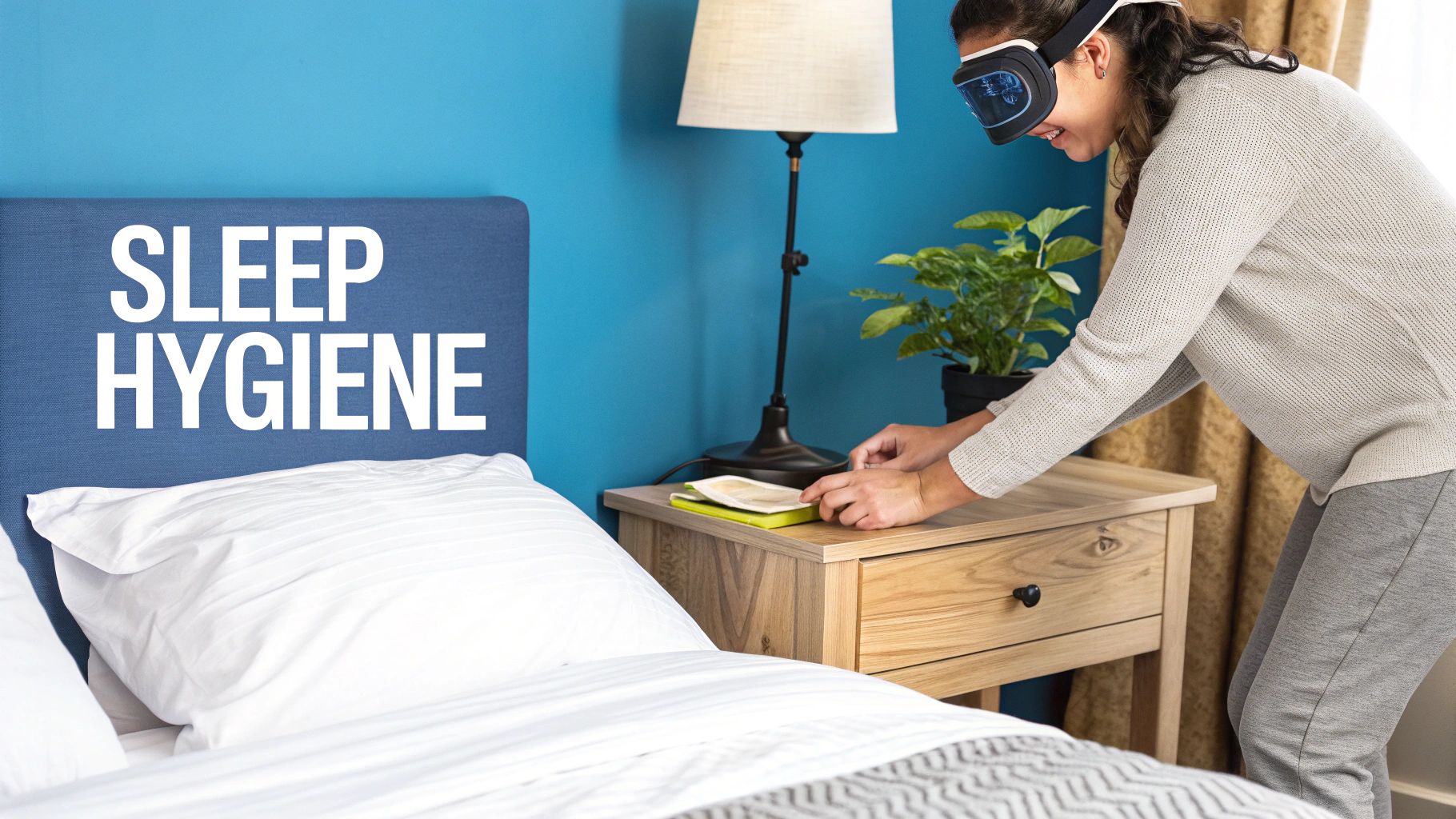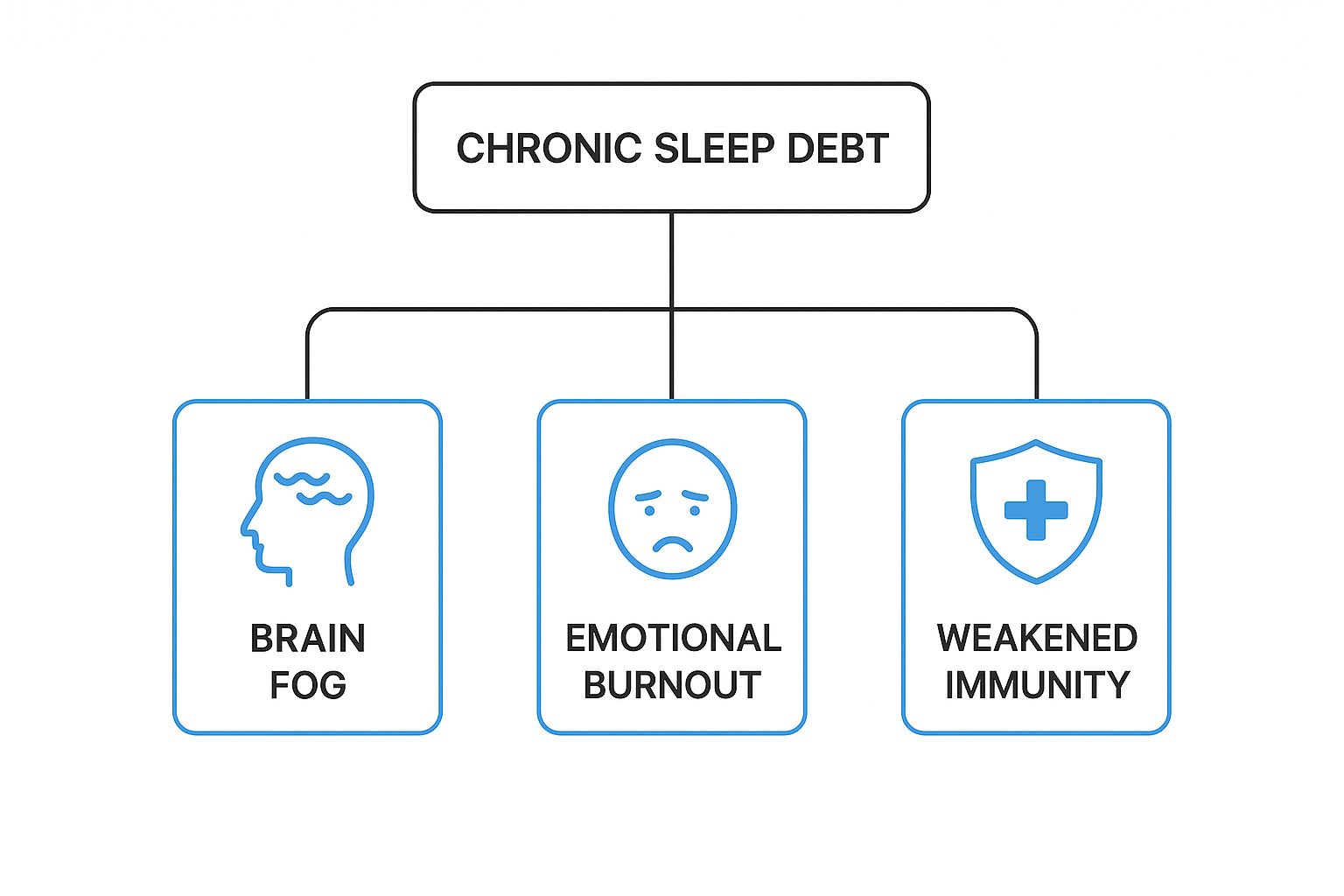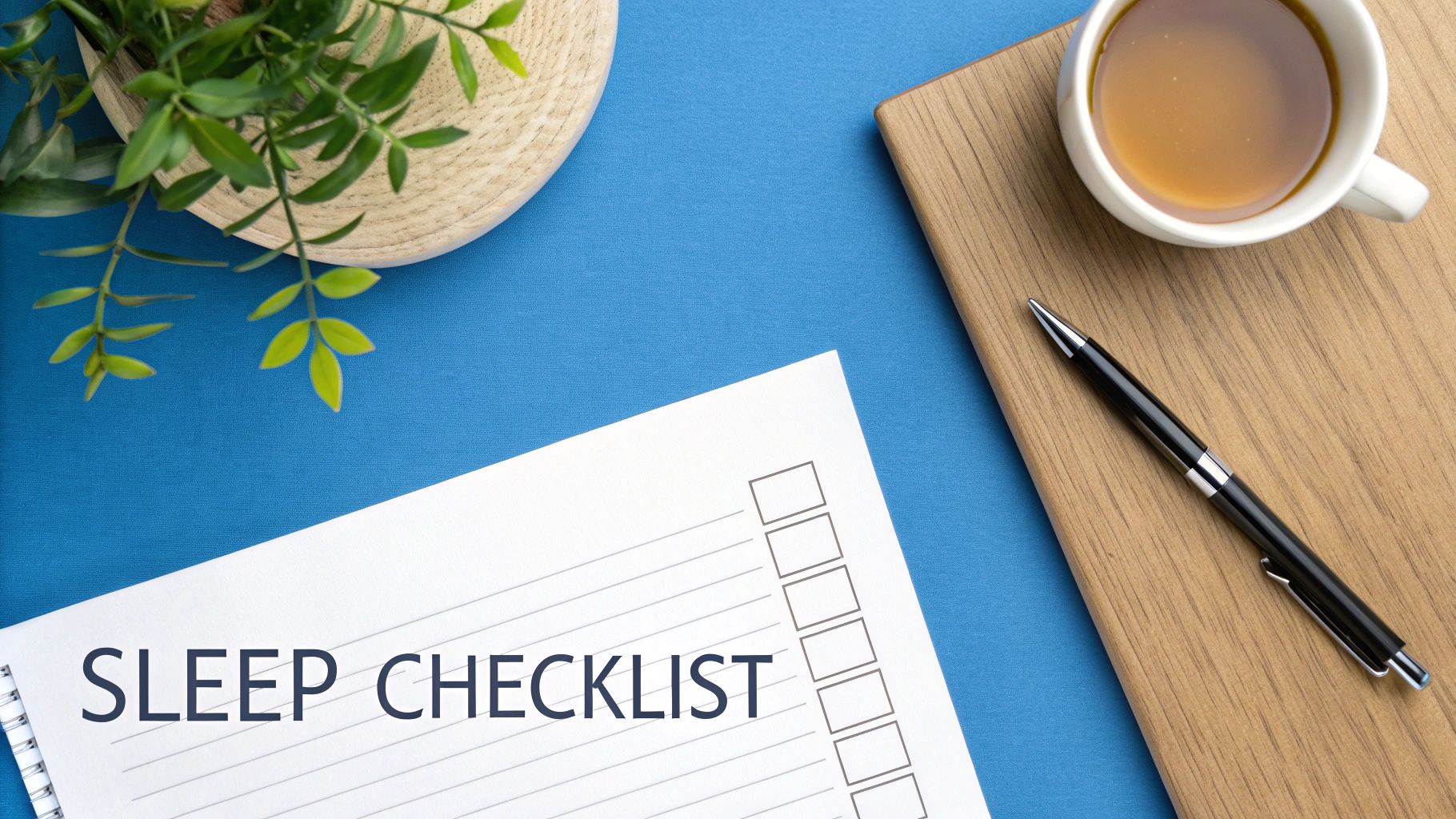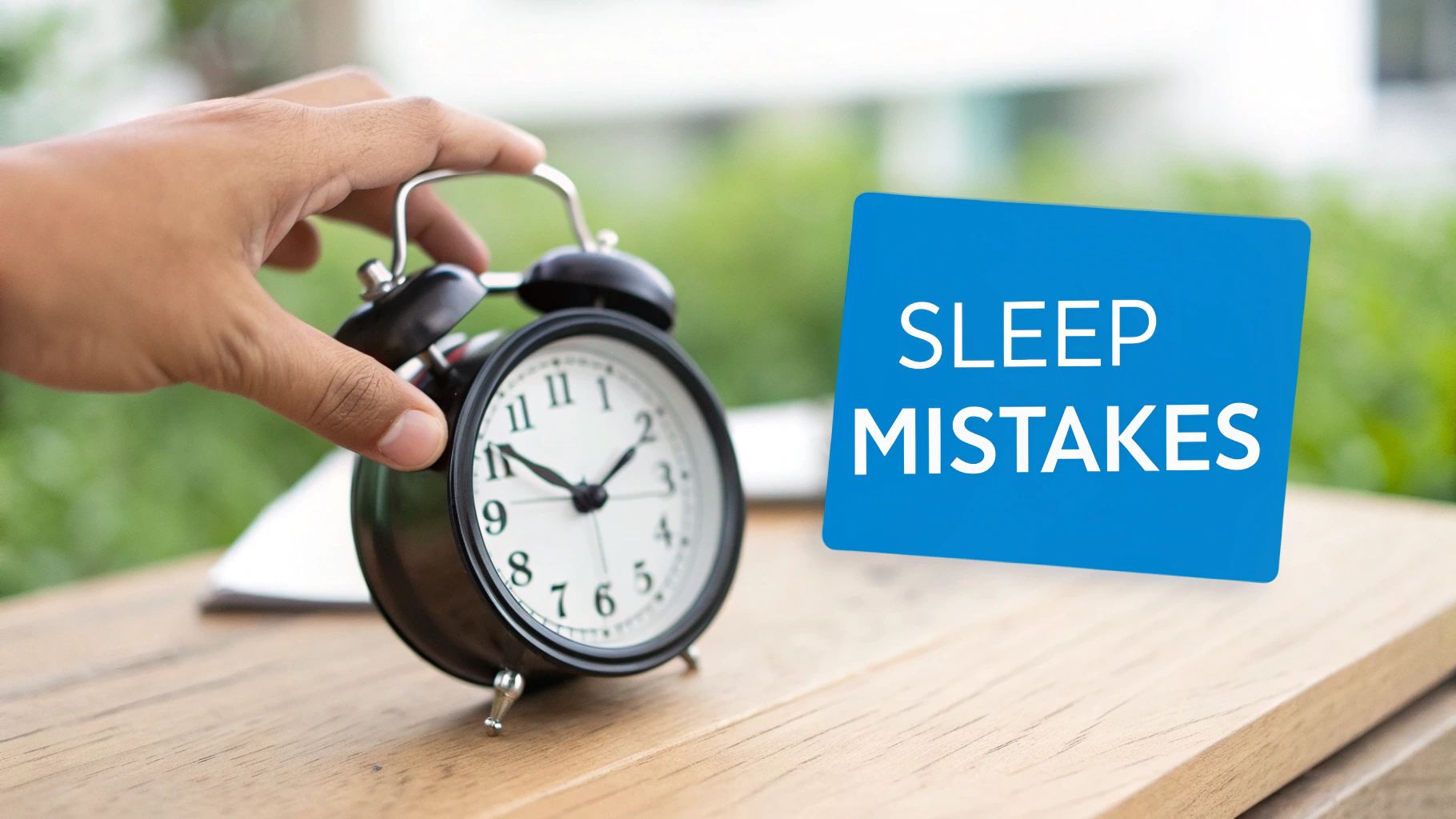You’ve probably heard the term sleep hygiene thrown around, but what does it actually mean?
Think of it like dental hygiene. You brush your teeth every day to prevent cavities. In the same way, good sleep hygiene is all about building a set of daily habits and routines that prevent the nasty side effects of bad rest, like brain fog and exhaustion.
Understanding What Sleep Hygiene Really Means

Sleep hygiene is the framework you build to support your nightly rest. It isn't a single magic bullet for a bad night's sleep. Instead, it’s the powerful combination of your environment, your behaviors, and your schedule all working together in harmony.
Getting quality rest isn’t just a matter of luck; it’s the result of intentionally creating the perfect conditions for your body and mind to unwind and recharge.
This proactive approach puts you back in the driver's seat. It recognizes that small, consistent actions throughout your day—from your morning coffee to your evening wind-down—have a huge impact on your sleep. The goal is to make these healthy sleep habits feel as natural and automatic as brushing your teeth.
The Pillars Of Good Sleep Hygiene At A Glance
Before we dive deeper, let's break down the core components of good sleep hygiene. Think of these as the foundational pillars that support every great night of sleep.
| Pillar | What It Means | Why It Matters |
|---|---|---|
| Consistency | Going to bed and waking up around the same time every day—yes, even on weekends. | This regulates your body's internal clock (circadian rhythm), making it easier to fall asleep and wake up naturally. |
| Environment | Creating a sleep sanctuary that is dark, quiet, cool, and comfortable. | A disruptive environment sends signals to your brain to stay alert, preventing you from reaching deep, restorative sleep stages. |
| Routine | Developing a relaxing pre-bed ritual to signal to your brain that it's time to power down. | A consistent wind-down routine helps transition your mind and body from the stress of the day into a state of rest. |
Getting these three pillars right is the first and most important step toward transforming your relationship with sleep.
The Foundation of Restorative Sleep
If you're struggling to sleep well, you're far from alone. A massive global survey revealed that the average person loses nearly three nights of restorative sleep every single week. That means many of us are sleep-deprived for almost half of our nights. You can read the full research on global sleep trends to see just how widespread this issue is.
This is precisely where understanding and practicing good sleep hygiene becomes a game-changer. By focusing on the pillars we just outlined, you’re not just hoping for better sleep—you're building a powerful, personalized system that makes it happen.
Why Better Sleep Hygiene Is a Modern Necessity
In our fast-paced, always-on culture, it’s all too easy to treat sleep like a luxury—something you can skimp on to get ahead. But cutting corners on rest isn't a shortcut to success. It's a direct path to accumulating chronic sleep debt, a deficit that has real, damaging consequences on your daily life.
Think of it like a financial debt. Missing an hour or two of sleep here and there might not seem like a big deal, but over weeks and months, that debt compounds. Before you know it, you're dealing with a cascade of issues that can seriously tank your quality of life.
The Real Cost of Poor Sleep
When sleep debt builds up, it affects everything from your mental clarity to your physical health. And we're not just talking about feeling a little tired; we're talking about a fundamental decline in your ability to function at your best.
The infographic below really breaks down how this debt branches out into three major consequences that many of us experience without ever connecting the dots back to poor sleep.

This shows that losing sleep isn't an isolated problem. It's often the root cause of so many common daily struggles that hold us back.
The bottom line is that you cannot be at your cognitive best without consistently getting enough high-quality sleep. It's a biological necessity, not a negotiable part of your schedule.
And this growing sleep deficit is a massive issue. One huge analysis of over 105 million nights of sleep revealed a statistically significant global decline in sleep quality in just one year. If you're a data person, you can dig into the global sleep trends and insights from Sleep Cycle's report to see the numbers for yourself.
This makes practicing good sleep hygiene more than just a healthy habit—it's a vital defense mechanism in the modern world. It’s one of the most powerful investments you can make in your mental sharpness, emotional stability, and overall health. Really understanding the health benefits of a good night's sleep is the first step toward reclaiming your rest and your vitality.
Your Actionable Sleep Hygiene Checklist

Alright, knowing the "why" behind sleep hygiene is one thing. Putting it into practice is where the magic really happens. Let's get down to business and turn that knowledge into a concrete plan you can start tonight.
We'll break it down into three key areas: your sanctuary, your rituals, and your daily habits. Think of it as building a powerful, personalized routine from the ground up.
Craft Your Sleep Sanctuary
Your bedroom needs to be a haven for rest. It should send a clear signal to your brain: "This is where we power down." The goal here is to get rid of distractions and dial up the comfort, creating a space that practically invites deep, restorative sleep. You'd be surprised what a few small tweaks can do.
- Make It Dark: Light is your brain's alarm clock. To get your bedroom truly dark—a cornerstone of good sleep hygiene—look into practical solutions like cellular shades for room darkening or even just a high-quality sleep mask. Every little bit helps.
- Keep It Cool: Your body temperature naturally needs to dip to kickstart the sleep process. To help it along, aim for a room temperature somewhere between 60-67°F (15-19°C).
- Silence the Noise: A car alarm, a barking dog, a loud neighbor—sudden sounds can easily yank you out of deep sleep. A white noise machine, a simple fan, or some comfortable earplugs can create a steady, peaceful soundscape that masks those disruptions. We dive deeper into this topic in our guide on creating an optimal sleep environment.
Build Your Nightly Rituals
When it comes to your internal body clock (your circadian rhythm), consistency is everything. A predictable wind-down routine is your secret weapon for transitioning from the hustle of the day into a state of calm, sleep-ready relaxation.
A consistent sleep-wake schedule is one of the most effective strategies for improving sleep quality. By anchoring your body clock, you make it significantly easier to fall asleep and wake up feeling refreshed.
Think of this ritual as a gentle runway to sleep. It's not about adding more chores to your list; it's about being intentional about slowing down.
- Set a Consistent Bedtime: This is the bedrock of good sleep hygiene. Try to go to bed and wake up around the same time every single day. Yes, even on weekends.
- Create a Device-Free Buffer: That blue light from your phone and tablet is a melatonin killer, and melatonin is the hormone that makes you sleepy. Power down all your screens at least 30-60 minutes before you plan to hit the pillow.
- Find Your Calm: Use that device-free buffer time for something that actually relaxes you. Maybe it's some light stretching, reading a real book (not on a screen!), listening to calm music, or practicing a bit of mindfulness.
Master Your Daily Habits
What you do from the moment you wake up has a massive impact on how well you sleep at night. That morning coffee, your workout, your evening meal—every choice can either support or sabotage your rest later on.
The struggle for a good night's sleep is real. In fact, a major systematic review estimated that roughly 16.2% of adults across the globe experience insomnia. You can see the full scope of the problem by checking out the research on insomnia prevalence. By making small, mindful changes to your daily habits, you can work to keep yourself out of that statistic.
Common Sleep Hygiene Mistakes You Might Be Making

Even with the best intentions, it's incredibly easy to fall into habits that quietly sabotage your sleep. The first step toward getting the restorative rest you need is spotting these common traps.
One of the biggest myths we tell ourselves is that we can "catch up on sleep" over the weekend. Sure, sleeping in feels great in the moment, but it throws your internal body clock—your circadian rhythm—completely out of whack. This phenomenon, sometimes called social jetlag, is why Monday mornings can feel so brutal.
The Snooze Button and Other Sleep Saboteurs
And what about that seemingly innocent snooze button? It's another major offender. Each time you hit it, you're fragmenting your sleep, kicking off a cycle of low-quality, light dozing that leaves you feeling groggy, not refreshed. It’s much, much better to set your alarm for the time you actually need to get up.
A lot of us also overlook how much what we eat and drink can mess with our sleep. For instance, managing late-night sugar cravings is a big one, as a sugar spike right before bed can send your sleep cycles into a tailspin. The same goes for caffeine, which can linger in your system for hours.
It's a common mistake to underestimate the lingering effects of stimulants. A coffee at 3 p.m. can easily disrupt your sleep architecture at 11 p.m., even if you don't feel "wired."
If you want to get into the weeds on this, check out our guide on why to stop consuming caffeine after 2 p.m..
Blurring the Lines Between Rest and Work
Finally, a few lifestyle habits can make a huge difference. Are you making any of these common mistakes?
- Working from Bed: This is a big no-no. It trains your brain to associate your bed with stress and alertness, not relaxation. Your bed should be a sanctuary for sleep and intimacy, period.
- Exercising Too Late: A tough workout is great, but not right before you want to sleep. It jacks up your core body temperature and heart rate, making it difficult to wind down. Try to wrap up any intense exercise at least three hours before hitting the hay.
- Skipping a Wind-Down Routine: You can't go from 100 to 0. Jumping straight from an action movie or checking work emails into bed gives your brain zero transition time. A consistent, relaxing routine isn't just nice to have—it's essential for quality sleep.
Knowing When Sleep Hygiene Is Not Enough
While powerful, even the most dedicated sleep hygiene routine isn't a silver bullet. Think of it like maintaining your car—regular oil changes and check-ups keep a healthy engine running smoothly, but they can't fix a busted transmission. It's crucial to know the difference between a rough patch of sleep and symptoms that point to something deeper.
A few bad nights here and there, maybe due to stress at work or a change in your schedule, are totally normal. But if your sleep problems just won't quit, no matter how hard you try, it might be time to look under the hood. Good sleep hygiene can absolutely help, but it may not be enough to solve a true sleep disorder on its own.
Recognizing Red Flags
Certain symptoms should be treated as red flags, signaling that you might need to chat with a professional. If any of the following sound familiar, it’s a good idea to consult a healthcare provider.
- Chronic Insomnia: You consistently struggle to fall asleep or stay asleep for multiple nights a week, and this has been going on for weeks or even months.
- Persistent Daytime Exhaustion: You feel overwhelmingly tired during the day, even after getting what should be a full night's rest (7-9 hours).
- Signs of Sleep Apnea: Your partner mentions you snore loudly and chronically, sometimes with gasping or choking sounds in the middle of the night.
- Restless Legs Syndrome (RLS): You have an uncontrollable, often maddening urge to move your legs, especially in the evening when you're trying to wind down.
Seeking help is a sign of strength, not failure. Sleep disorders are medical conditions that often require specific treatments beyond lifestyle adjustments.
Don't let frustration build if your sleep hygiene checklist isn't solving the problem. Instead, see your efforts as an important first step. By ruling out lifestyle factors, you're actually gathering valuable information for your doctor. This helps them pinpoint the root cause much faster, getting you the proper care you need to finally get a good night's rest.
Your Sleep Hygiene Questions Answered
Even with a solid game plan, starting any new routine brings up a few questions. As you start cleaning up your sleep habits, you're probably wondering about timelines, exceptions, and how to handle a few real-world challenges. Let's get into the most common questions that pop up on the journey to better rest.
How Long Does Better Sleep Hygiene Take to Work?
It's totally normal to want results, like, yesterday. But when it comes to sleep hygiene, consistency is the real game-changer. While some tweaks—like making your room darker or cooler—can pay off tonight, the lasting benefits build up over time. Most people start to feel a real difference within one to two weeks of sticking with it.
Think of it like going to the gym. Your body’s internal clock, also known as your circadian rhythm, needs a little time to learn and adapt to the new, reliable schedule you're setting. The single most important factor is just showing up and doing the work.
Can I Have a Different Sleep Schedule on Weekends?
Ah, the temptation to sleep in on Saturday. We've all been there. But drastically shifting your schedule can throw you into something called "social jetlag," which is exactly why Monday mornings can feel so brutal. It confuses your internal clock, making it harder for your body to figure out when to feel tired and when to feel awake.
If you absolutely have to catch a few extra winks, try to keep it within one hour of your usual wake-up time. Honestly, keeping a consistent sleep schedule seven days a week is one of the most powerful things you can do for your sleep.
A consistent sleep schedule anchors your circadian rhythm, making it easier to fall asleep and wake up naturally. This single habit can have a more significant impact than almost any other change you make.
What If My Bedroom Is Noisy?
Uncontrollable noise is a huge sleep-wrecker, especially if you live in a busy city or a lively apartment building. When you can't get rid of the noise at its source, your best bet is to mask it. Creating a consistent, steady soundscape can stop sudden, sharp noises from yanking you out of a deep sleep.
Here are a few tools that get the job done:
- A White Noise Machine: These are designed to produce a steady hum that effectively smothers jarring sounds.
- A Simple Fan: For many people, the constant drone of a fan works just as well.
- Comfortable Earplugs or Headphones: If you need to block out the world more directly, a good pair of earplugs or sleep-friendly headphones is your best friend.
Are Daytime Naps Good or Bad?
Naps can be a bit of a double-edged sword. A short, strategic "power nap" of about 20-30 minutes in the early afternoon can be great for boosting alertness without messing with your nighttime sleep. But taking long naps, or napping any time after 3 p.m., can backfire.
Napping too long or too late in the day eats away at your "sleep drive"—that natural pressure that builds all day and helps you feel sleepy at bedtime. If you're wrestling with insomnia, it's often best to skip naps altogether to make sure your sleep drive is at full strength when your head hits the pillow.
Ready to create the perfect soundscape for your sleep sanctuary? DubsLabs Bedphones are designed to be worn comfortably all night long, helping you mask noise and drift off to your favorite relaxing audio. Discover how our ultra-thin headphones can transform your rest at https://www.dubslabs.com.











































